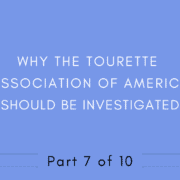Researchers Uncover Mechanism Controlling Tourette Syndrome Tics
A mechanism in the brain that controls tics in children with Tourette Syndrome (TS) has been discovered by scientists at The University of Nottingham, UK.
The study, published in the British Psychological Society’s Journal of Neuropsychology, could lead to new non-drug therapies to help young people with Tourette Syndrome overcome the repetitive physical movements and vocal sounds which characterise their condition.
Professor Stephen Jackson, in the University’s School of Psychology, said: “This new study is very important as it indicates that motor and vocal tics in children may be controlled by brain changes that alter the excitability of brain cells ahead of voluntary movements. You can think of this as a bit like turning the volume down on an over-loud motor system. This is important as it suggests a mechanism that might lead to an effective non-pharmacological therapy for Tourette Syndrome.”
“The research is based on the general hypothesis that an area in the brain called the striatum is overactive as a result of alterations in the early development of the brain. As a result, the signals that are relayed to the brain’s cortex region lead to hyper-excitability and cause tics to occur.
“We have looked at how that hyperactivity and the resultant tics might be controlled by finding a way to ‘turn down the volume’ on that ‘cortical excitability’. This is potentially extremely important as the parents of children with tics are desperate to find a safe and effective therapy that is an alternative to drug treatments.”
See the full press release here.









